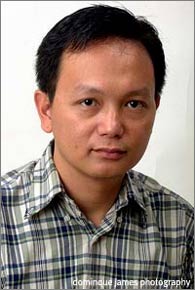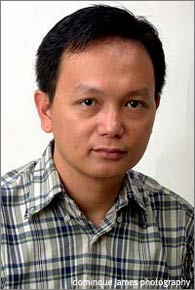Oscar Atadero works as a full time gay activist for Progay-Philippines, a network of grassroots gay men, bisexuals and transsexuals. They are currently are conducting Raising Awareness for Gay Empowerment (RAGE) community forums which unite schools, villages and offices into confronting homophobia and discrimination. They also organize village-based gay-bi-trans and straight people into support groups that are oriented for human rights advocacy and education. The 37-year-old enjoys scuba diving and cookery; and is interested in herbal medicine, solar and other alternative energy, genetic engineering, rural development and political philosophy.

Fridae: When did you realise you were gay or lesbian? What was the process like?
I realized I was gay when I felt attraction for men at four years of age. I didn't know what it was then; I just liked being with guys of all ages at school and my father's grocery. When I was in high school, I found it hard to accept using the most common Filipino word "bakla" (faggot) to describe what and how I feel and I was very homophobic myself.
In college, I joined left-wing student movements to whom I outed myself, and I was told to become straight. All the while I sublimated my feelings and was looking around in vain for gay resources that I could identify with. There being none, I heard about cruising places where I met closeted guys like myself and that helped me a lot in accepting myself as gay and prepared me for the time when I can come out and proclaim myself as one.
Fridae: Are you out to family and friends? If yes, could you tell us something about it? Is it an important factor in your life?
Yes I am out to family and friends since 1994, when I joined the first gay and lesbian march in the Philippines (and the entire Asia-Pacific islands region, I believe, if you don't count in Australia and US territories in the Pacific). Shortly thereafter, I started a gay column for a locally circulated magazine called Mr&Ms. My family who used to bug me to get married was shocked and my parents pressured me to leave home. I was wholly unprepared since we were raised to be dependent on the small family business all our lives, and it was the most painful and difficult part of my life, since the isolation was compounded by the sudden economic dislocation.
To support myself, I worked for non-government organizations, whose left wing politics developed into greater acceptance of gay people and issues. It was also a lonely road for a gay face to appear openly before cameras and talk about our issues the whole year round, since many community members considered it threatening to articulate gay images in the Manila mass media which were then only beginning to shed the most blatant bigoted attitudes.
In retrospect, I now consider being out as a very important part of my life as it taught me to appreciate the subtle issues involved in how Asians perceive their sexualities and how different it is from Western activist politics. It was hard work then, but looking back I can now appreciate myself more and not feel so alone out of the closet. Many straight people come up to tell me how they appreciate my visible contribution to make gay issues more accessible to the Filipino masses, but little did they know that everytime I talk before millions of households on primetime talk shows, my parents would wince with feelings of shame before their Chinese relatives and friends.
But just last week, my mother, brothers and sisters cooked a traditional lauriat lunch of misua (hair-thread rice noodles) and dimsum, and we were holding back tears while renewing our ties. I plan to visit my sick father soon.
Fridae: Do you believe in monogamous or open relationships? Are you in one?
I personally believe in monogamous relationships and hope to be in one soon. I just met an out guy who is still working out his personal issues; really hope he believes in monogamy like I do. There's a lot of pressure on the growing numbers of people who are not gainfully employed due to the economic crisis raging in the Philippines and labor export policies to become cynical of monogamy and resort to increasingly casual forms of sex and domestic arrangements, I hope that both of us can weather bumming around and constant search for jobs and growing apart in the process.
Fridae: What kind of underwear person are you?
I buy lots of white cotton briefs, I don't know what to make of that - boring?
Fridae: What's your favourite CD? Why?
Running on Empty by Jackson Browne. Why? If I were to be marooned on a desert island, I'd keep that CD because its soul makes me thankful I am alive.
Fridae: Have you ever encountered prejudice because of your gender/sexuality? How did you deal with it?

A few times I feel the worst kinds of prejudice against gays come from gays themselves. Financially successful gay men, both effem and butch, tend to diss poorer and louder sisters and blame them for bringing shame to the general gay community.
Fridae: Do you work with/support any gay or lesbian community groups? How? Have you ever participated in any pro-gay or lesbian events/parties/workshops? If so, which?
I work full time for Progay-Philippines, a network of grassroots gay men, bisexuals and transsexuals, and this group is based among the most marginalized and poorest sections. We organize village-based gay-bi-trans and straight people into support groups that are oriented for human rights advocacy and education. Right now, we are conducting Raising Awareness for Gay Empowerment (RAGE) community forums, which unite schools, villages and offices into confronting homophobia and discrimination.
Fridae: What do you think we need most in Asia's gay and lesbian community?
I think we need a short start-up period of mapping a unity of diverse ideas, sort of like the decoded human genome, of our gender and sexuality that is not copied blindly from Western understanding and ideals. Speaking for the gay male community among the Filipino urban poor and working class, we are coming to some leveling off regarding the mutual distrust and artificial divide between effems and butches, bi and gay, out and closeted, traditional and modern.
After that period of identity mapping, Asian gay people nation by nation need to decide if they want to celebrate an unchanging picture of themselves, or use this information to fuel an agenda for social change. Pretty abstract, no? But somewhere sometime, you got to identify some unsavory features that can be linked to the gay community, like sex tourism and sex trafficking, that really need changing and not all quirks are acceptable.
Fridae: In the context of being an Asian gay or lesbian, do you have any personal role models/inspirations?
My pop icons are the openly gay men who discuss gay issues openly in the mass media - talk show host Boy Abunda and hairdresser Ricky Reyes. Most openly gay men shun discussing gay issues on cam like a plague, citing kilometric lines of embarrassed apologies before they say being gay is a sin and we don't deserve to abuse the patience of our polite audience (better we discuss the millionth fashion show, the next muscle pageant...). But Boy and Ricky do not bat an eyelash to tell us they have lovers, and they lived another day to show us their careers didn't flop.
Fridae: What advice would you give to someone who is trying to come to terms with his or her sexuality?
If you are troubled about how people will accept you, and that is the problem I usually encounter among Manila gays - my advice would be to give the straight people around you more credit than they deserve - they may actually understand you more than you can ever understand yourself.
In my experience in my country, hets turn out to be a lot less intrinsically homophobic, and they can easily understand how it is to have gay feelings, only if we are patient enough to explain our side and get their side, too. Sometimes we exert too much effort trying to hide or dispel our sexuality, but if instead we grab the word gay and proudly carry it, the public will eventually become more accepting.
With this in mind, an individual closeted gay man or woman will likely have greater chances of positive sexual growth by joining, even if secretly, broad community groups, rather than depending on tightly private small groups of bitter couples who talk a lot against coming out of the closet.











 Printable Version
Printable Version











Reader's Comments
Be the first to leave a comment on this page!
Please log in to use this feature.